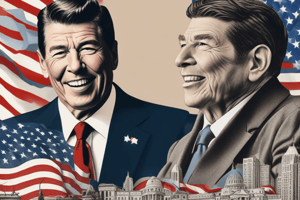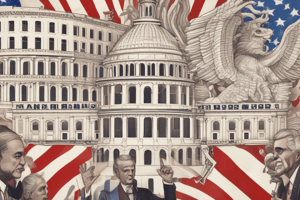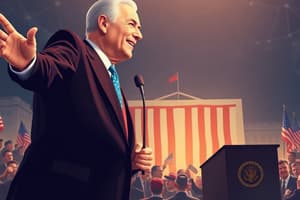Podcast
Questions and Answers
What was the main objective of the Union in the Civil War?
What was the main objective of the Union in the Civil War?
- To invade, conquer, and occupy the South (correct)
- To establish a new government in the North
- To free all slaves in the South
- To defend the North against the Confederacy
What percentage of goods were made up by factories in the Union?
What percentage of goods were made up by factories in the Union?
- 70%
- 90% (correct)
- 50%
- 100%
What was the primary goal of the Confederacy in the Civil War?
What was the primary goal of the Confederacy in the Civil War?
- To establish a new government in the South
- To abolish slavery
- To conquer the North
- To defend the South and preserve their way of life (correct)
What was the largest city in the Union in terms of population?
What was the largest city in the Union in terms of population?
What was the advantage of the Union's navy compared to the Confederacy's?
What was the advantage of the Union's navy compared to the Confederacy's?
What was the main difference between the crops produced in the Union and the Confederacy?
What was the main difference between the crops produced in the Union and the Confederacy?
What was the main difference between Abraham Lincoln's and John C. Breckinridge's stance on slavery?
What was the main difference between Abraham Lincoln's and John C. Breckinridge's stance on slavery?
What was a major difference between the economies of the Union and the Confederacy?
What was a major difference between the economies of the Union and the Confederacy?
What was the significance of the Compromise of 1850?
What was the significance of the Compromise of 1850?
What was the main purpose of Harriet Beecher Stowe's book, Uncle Tom's Cabin?
What was the main purpose of Harriet Beecher Stowe's book, Uncle Tom's Cabin?
Why did Southerners fear Lincoln's presidency in 1860?
Why did Southerners fear Lincoln's presidency in 1860?
What was the outcome of the Dred Scott court case?
What was the outcome of the Dred Scott court case?
What was the outcome of the battle at Fort Sumter?
What was the outcome of the battle at Fort Sumter?
What was Jefferson Davis's belief regarding states' rights?
What was Jefferson Davis's belief regarding states' rights?
What was the main issue of the Kansas-Nebraska Act?
What was the main issue of the Kansas-Nebraska Act?
What was John Bell's main goal?
What was John Bell's main goal?
What was Grant's military position during the Civil War?
What was Grant's military position during the Civil War?
How did Lincoln initially approach the seceding Southern states after his election?
How did Lincoln initially approach the seceding Southern states after his election?
Flashcards are hidden until you start studying
Study Notes
John Brown's Raid
- John Brown led a group of 18 men to Virginia to start a rebellion against slavery.
The Union
- The Union consisted of larger cities, with factories making up to 90% of the goods.
- Farms in the Union produced crops like corn, wheat, and oats.
- The Union's main objective in the Civil War was to invade, conquer, and occupy the South.
- The largest city in the Union was New York City, with a population of 800,000 people, of which only about 36,000 were black.
- The Union had a larger economy, with many agricultural and industrial resources.
- The Union had more railroads and the ability to move and create railroads.
- Although the Union had a smaller army, they used railroads and steamships to transport supplies and troops.
- The Union had a better navy that produced 32 times more firearms than the Confederates.
The Confederacy
- The Confederacy had smaller cities with fewer factories, and their farms produced crops like cotton, rice, and tobacco.
- The main objective of the Confederacy was to defend the South, and preserve their way of life, which included slavery.
- Their goal was to hold out long enough in the war to become independent and keep their slave laws.
- The largest city in the Confederacy was New Orleans, with a population of 170,000, of which about 66,000 were black.
- The Confederacy had a smaller, more agricultural-based economy, with much fewer railroads and mainly transported goods by water.
- They had a smaller army and often had trouble getting food and supplies to their army.
- They had a small navy and few shipyards, but had many more military colleges than the Union.
Election of 1860
- Stephen A. Douglas supported slavery in the South and wanted each state to decide on slavery.
- Abraham Lincoln supported slavery where it already existed, but not in new territories, and believed in westward expansion.
- John C. Breckinridge supported slavery and wanted it in all territories.
- John Bell believed in preserving the Union and Constitution.
- Abraham Lincoln won the Election of 1860.
Events Leading to the Civil War
- The Compromise of 1850 made California join the Union as a free state, abolishing slavery in California.
- Uncle Tom's Cabin, a book by Harriet Beecher Stowe, advocated for the abolition of slavery and brought awareness to the nation.
- The Kansas-Nebraska Act (1854-1861) overruled the Missouri Compromise, showing the determination of those who supported slavery.
- The Dred Scott court case argued over whether slaves were considered people.
Key Figures
- Abraham Lincoln was elected president of the United States in 1860, and after the South seceded, he concluded that the war was necessary.
- Jefferson Davis believed that each state had the right to secede from the Union if necessary and was elected as president of the Confederacy.
- Ulysses S. Grant helped recruit men to fight, worked his way up to Lieutenant General, and was known for his tough fighting style that often resulted in many casualties.
Studying That Suits You
Use AI to generate personalized quizzes and flashcards to suit your learning preferences.




